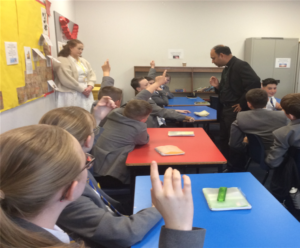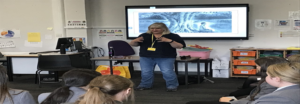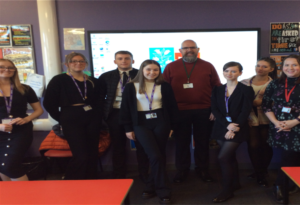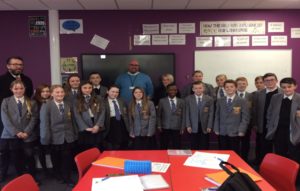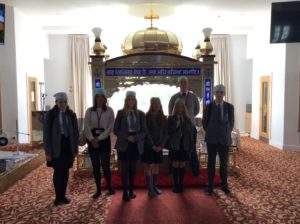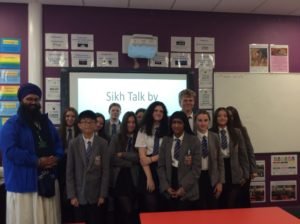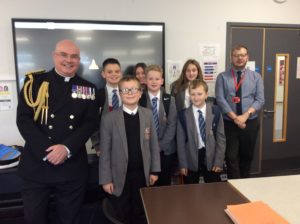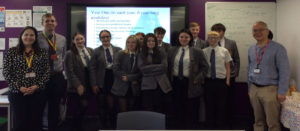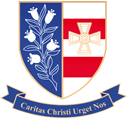Teachers of religious education at St. Joseph’s live and breathe our faith. We are a team of dedicated subject specialists who have been called to live out our vocations and we love helping our fantastic young people grow in faith, understanding and respect of the Catholic faith, other Christian denominations and World religions.
The RE curriculum at St. Joseph’s is built upon three guiding principles: spiritual development, engagement and academic formation.
Spiritual development:
At St. Joseph’s students are given the time to reflect upon their own spiritual path and time is regularly embedded into the RE curriculum to help students plan and deliver Mass, Celebration of the Word and experience a wide-variety of prayer. Students work with their teachers and chaplain to create meaningful acts of Collective Worship and love planning and practice for class Mass, welcome Masses and class Celebrations of the Word.
We run ‘pray like a …’ lessons in Key Stage 3 where students have the opportunity to experience prayer from a wide range of traditions and explore how it impacts them. Lessons begin with prayer and include singing prayers, prayer star jumps, meditative and silent prayers and creative prayers. Students have the opportunity to engage in in-school retreats, called ‘the EVENT’, take part in spiritually forming theme days like CAFOD day and meet with a wide variety of guest speakers such as clergy, army and Royal navy chaplains, American Christians and speakers from other faith traditions.
Engagement:
The whole religious education curriculum is centred around engagement. We strive to enthuse students about both the Catholic faith and other faith traditions. Students are regularly engaged in project-based learning such as ‘designing faith apps’ inspired by Blessed Carlo Acutis, to taking part in ‘community cohesion’ projects that allow students to explore community cohesion first-hand.
We aim for lessons to be experiential and for students to demonstrate their learning through a wide-variety of methods including speaking and listening presentations, drama, mime, song, dance, model making and debate. We believe that engaged learners will strive to develop both spiritually and academically and we love instilling a love of religious education in our young people and seeing them develop both in their faith, knowledge, skill and empathy for others.
Academic formation:
As a department we have the highest standards for our students and we challenge them to not only love religious education, but to strive to succeed. We use our passion for our subject and our faith to enthuse students and motivate them to achieve the highest possible grade they can. We want all students to make the best progress they can and we work passionately to give all students the opportunity, love and support needed to do this.
Guest speakers and extra-curricular opportunities
We want our students to explore first-hand the amazing opportunities available from studying religious education and meet with people who live out an amazing and diverse array of vocations. In RE students have the opportunity to meet British Army and Royal Navy chaplains, prison chaplains, parish clergy, Bishop Stephen, Christians from America, speakers from the Durham Oriental Museum, charity workers from CAFOD and the Terrence Higgins Trust and faith speakers from the Buddhist, Sikh and Jewish communities in order to help engage and bring religion to life. We even have an ex-student who has gone onto DJ on national radio come in to deliver a faith talk called ‘the blind leading the sighted’.
We also offer students the opportunity to get involved with an array of national Catholic awards including the Faith in Action Bronze and Silver Awards in Key Stage 3 and the Pope John Paul II award at Sixth Form. We also offer competitions like the RE TOWIE inter-trust competition (The Only Way Is Ethics) at KS4 and KS5.
We organise trips to CYMFED FLAME, we visit the Sikh Gurdwara in Newcastle, we attend Philosophy and Ethics conferences and take our students to Durham University to the school of Theology to experience what it is like to study religious education at university level.
Key Stage 3:
Year 7
Students in Year 7 study the new Religious Education Directory from the Bishops of England and Wales. This follows six branches entitled Creation and Covenant, Prophecy and Promise, Galilee to Jerusalem, Desert to Garden and Dialogue and Encounter. In these fascinating modules, students will explore everything from cracking the Biblical code, through to Green washing and virtue signalling.
They will have to understand, discern and respond to key ethical issues including stewardship and philanthropy, they will explore vocations such as what it means to be a Jesuit priest like Pope Francis and they will even examine the fascinating world of Hinduism and the wide and varied beliefs and practices of this awesome religion.
Year 8
Students in Year 8 currently follow the RECD of 2012, however from September 2024 will study the new Religious Education Directory course, building upon their work in Year 7.
Currently, students study a diverse and engaging curriculum of topics including the sacrament of confirmation, which prepares them for the sacrament of confirmation which we offer through the parish. They also study Vocation and Marriage, Holocaust Theology, issues of Life and Death and they end with an exciting study of Islam.
Year 9
Students in Year 9 currently follow the RECD of 2012 and focus in year 9 upon applied Catholic Ethics. In this course we look at key Catholic teachings and beliefs and then apply them to an exciting range of contemporary moral issues. This ranges from Catholic attitudes to Genetic Engineering, cloning and designer babies through to capital punishment, eco-cities and the Just War theory. Students look at Pope Francis’ attitude to social media and explore the role of religion on the internet, then we explore community cohesion, relationship ethics and finish the year examining the fascinating religion of Sikhism which is the second biggest religion in South Tyneside. Students will explore what it means to be a Sikh in the North East of England today and there is even an opportunity to meet with a Sikh guest speaker and visit the Newcastle Gurdwara and serve in their langar.
GCSE:
All students in Key Stage 4 study the EDUQAS Religious Studies Route B course in Catholic Theology and Judaism.
Year 10
Students study the Foundational Catholic Theology paper exploring the exciting modules of Origins and Meanings and Good and Evil. Students will explore differing theories on the creation of the world, attitudes to contemporary moral issues including abortion and stewardship and examine the roles played by charities such as the SVP and CAFOD in promoting human dignity.
Students then examine the origins and purpose of evil and suffering and differing ways that Catholics can atone for sin such as pilgrimage, praying the rosary and the role of statues and icons in worship. To conclude the year, students begin to examine a range of Jewish beliefs as part of their study of a world religion.
Year 11
We begin the Year 11 course by examining Jewish practices i.e. how Jewish people live out their beliefs and celebrate their fascinating faith. Then we begin our quest through Applied Catholic Theology exploring Life and Death and Sin and Forgiveness.
These modules examine Catholic beliefs regarding life after death, euthanasia/assisted suicide, palliative care, the impact of the Second Vatican Council and parables of eschatology. We also examine the morality of capital punishment, Catholic teaching on forgiveness, evangelisation and the role of Mary and the nature of the Church.
Sixth Form CORE RE
Year 12
Students in Sixth Form all study 1 hour per week of CORE RE. After beginning with our Year 12 welcome Mass in September students then undertake the ‘St. Joseph’s Laudato si Silver Award’ which is accredited internally and requires students to study in two exciting ways:
- Firstly, students attend a fortnightly lecture to prepare them for the rigours of university study. These lectures cover everything from Catholic beliefs about death, exorcism and guardian angels through to the ethics of Artificial Intelligence, Holocaust Theology and the ethics of animal warfare. These lectures are current and planned with a focus upon the Catholic faith in the contemporary world.
- Secondly, students attend a fortnightly workshop seminar with a teacher. These sessions are project based and require students to put Catholic teaching into action through three key modules. Firstly, they examine moral commerce and are required to work collaboratively to set up their own ethical company, pitch it, create it and advertise it looking at how to be a moral boss and trade with Catholic teachings at their heart. Then students study a bespoke RSE programme, rooted in Catholic teaching and created by sixth form students themselves. Finally, they undertake a Digital Religion project creating either modern parables, ethical apps or music videos based in the Catholic faith. These sessions not only deepen students’ understanding of faith but enhance skills for life such as oracy, teamwork and organisational skills essential for their future career.
Year 13
In Year 13 students undertake the Gold level of their St. Joseph’s Laudato Si Award. This includes fortnightly lectures on topics such as the morality of happiness, religion in the media, Disney and religion, religion and drugs, philanthropy and catholic teaching. Then in their seminar groups students debate and explore fascinating topics such as Catholic attitudes to immigration, animal rights, fertility treatment, homelessness and genocide.
Students also get to interview the school priest about his vocation and meet with a range of fascinating guest speakers and they end with an end of Sixth Form leavers liturgy to mark the end of their spiritual journey through St. Joseph’s.
A-Level religious education
At A-Level, students study three very exciting and academically rigorous papers in Philosophy, Ethics and New Testament studies. All our A-Level teachers are passionate about these subjects and have a wealth of experience teaching them and we deliver several modules for the CCRS in these areas to help support other teachers in the diocese with their subject knowledge.
In Philosophy, students explore exciting modules such are arguments for the existence of God, why does God allow natural and moral evil and is there an afterlife? In Ethics, students explore how to make an ethical decision and then apply these exciting ethical and sometimes wacky theories to fascinating topics such as war, sex, equality and life and death issues. In New Testament, we explore the differing perspectives of the Gospel writers, the socio-historical and cultural setting of the New Testament and then examine the validity of the crucifixion and resurrection in light of scientific rationalism.
Students studying our A-Level course have gone on to do a wide variety of amazing careers including midwifery, police, law, teaching, psychologists, armed forces and even radio DJing for BBC radio 1.
